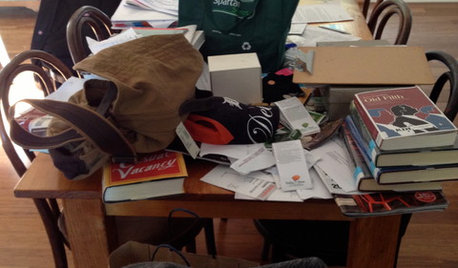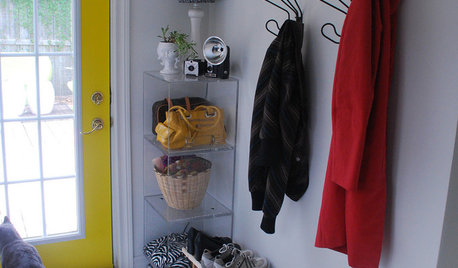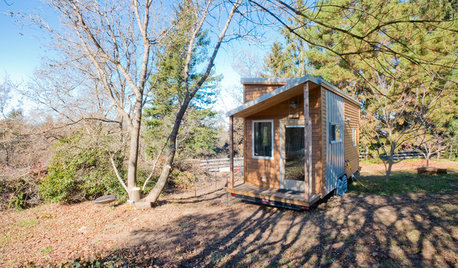Insane Ag System- Is it really this bad?
Found this on another forum. Is the system really this bureaucratic and monopolized?
"Everything I want to do is illegal. As if a highly bureaucratic regulatory system was not already in place, 9/11 fueled renewed acceleration to eliminate freedom from the countryside. Every time a letter arrives in the mail from a federal or state agriculture department my heart jumps like I just got sent to the principals office.
And it doesnÂt stop with agriculture bureaucrats. It includes all sorts of government agencies, from zoning, to taxing, to food inspectors. These agencies are the ultimate extension of a disconnected, Greco-Roman, Western, egocentric, compartmentalized, reductionist, fragmented, linear thought process.
ON-FARM PROCESSING
I want to dress my beef and pork on the farm where IÂve coddled and raised it. But zoning laws prohibit slaughterhouses on agricultural land. For crying out loud, what makes more holistic sense than to put abattoirs where the animals are? But no, in the wisdom of Western disconnected thinking, abattoirs are massive centralized facilities visited daily by a steady stream of tractor trailers and illegal alien workers.
But what about dressing a couple of animals a year in the backyard? How can that be compared to a ConAgra or Tyson facility? In the eyes of the government, the two are one and the same. Every T-bone steak has to be wrapped in a half-million dollar facility so that it can be sold to your neighbor. The fact that I can do it on my own farm more cleanly, more responsibly, more humanely, more efficiently, and in a more environmentally friendly manner doesnÂt matter to the government agents who walk around with big badges on their jackets and wheelbarrow-sized regulations tucked under their arms.
OK, so I take my animals and load them onto a trailer for the first time in their life to send them up the already clogged interstate to the abattoir to await their appointed hour with a shed full of animals of dubious extraction. They are dressed by people wearing long coats with deep pockets with whom I cannot even communicate. The carcasses hang in a cooler alongside others that were not similarly cared for in life. After the animals are processed, I return to the facility hoping to retrieve my meat.
When I return home to sell these delectable packages, the county zoning ordinance says that this is a manufactured product because it exited the farm and was reimported as a value-added product, thereby throwing our farm into the Wal-Mart category, another prohibition in agricultural areas. Just so you understand this, remember that an on-farm abattoir was illegal, so I took the animals to a legal abattoir, but now the selling of said products in an on-farm store is illegal.
Our whole culture suffers from an industrial food system that has made every part disconnected from the rest. Smelly and dirty farms are supposed to be in one place, away from people, who snuggle smugly in their cul-de-sacs and have not a clue about the out-of-sight-out-of-mind atrocities being committed to their dinner before it arrives in microwaveable, four-color-labeled, plastic packaging. Industrial abattoirs need to be located in a not-in-my-backyard place to sequester noxious odors and sights. Finally, the retail store must be located in a commercial district surrounded by lots of pavement, handicapped access, public toilets and whatever else must be required to get food to people.
The notion that animals can be raised, processed, packaged, and sold in a model that offends neither our eyes nor noses cannot even register on the average bureaucratÂs radar screen  or, more importantly, on the radar of the average consumer advocacy organization. Besides, all these single-use megalithic structures are good for the gross domestic product. Anything else is illegal.
ON-FARM SEMINARS & ÂAGRITAINMENTÂ
In the disconnected mind of modem America, a farm is a production unit for commodities  nothing more and nothing less. Because our land is zoned as agricultural, we cannot charge school kids for a tour of the farm because that puts us in the category of "Theme Park." Anyone paying for infotainment creates "Farmadisney," a strict no-no in agricultural zones.
Farms are not supposed to be places of enjoyment or learning. They are commodity production units dotting the landscape, just as factories are manufacturing units and office complexes are service units. In the governmentÂs mind, integrating farm production with recreation and meaningful education creates a warped sense of agriculture.
The very notion of encouraging people to visit farms is blasphemous to an official credo that views even sparrows, starlings and flies as disease threats to immunocompromised plants and animals. Visitors entering USDA-blessed production unit farms must run through a gauntlet of toxic sanitation dips and don moonsuits in order to keep their germs to themselves. Indeed, people are viewed as hazardous foreign bodies at Concentrated Animal Feeding Operations (CAFOs).
Farmers who actually encourage folks to come to their farms threaten the health and welfare of their fecal concentration camp production unit neighbors, and therefore must be prohibited from bringing these invasive germ-dispensing humans onto their landscape. In the industrial agribusiness paradigm, farms must be protected from people, not to mention free-range poultry.
The notion that animals and plants can be raised in such a way that their enhanced immune system protects them from kindergarteners germs, and that the animals actually thrive when marinated in human attention, never enters the minds of government officials dedicated to protecting precarious production units.
COLLABORATIVE MARKETING
I have several neighbors who produce high-quality food or crafts that complement our own meat and poultry. Dried flower arrangements from one artisan, pickles from another, wine from another, and first-class vegetables from another. These are just for starters.
Our community is blessed with all sorts of creative artisans who offer products that we would love to stock in our on-farm retail venue. DoesnÂt it make sense to encourage these customers driving out from the city to be able to go to one farm to do their rural browsing/ purchasing rather than drive all over the countryside? Furthermore, many of these artisans have neither the desire nor time to deal with patrons one-on-one. A collaborative venue is the most win-win, reasonable idea imaginable  except to government agents.
As soon as our farm offers a single item  just one  that is not produced here, we have become a Wal-Mart. Period. That means a business license, which isbasically another layer of taxes on our gross sales. The business license requires a commercial entrance, which on our country road is almost impossible to acquire due to sight-distance requirements and width regulations. Of course, zoning prohibits businesses in our agricultural zones. Remember, people are supposed to be kept away from agricultural areas  people bring diseases.
Even if we could comply with all of the above requirements, a retail outlet carries with it a host of additional regulations. We must provide designated handicapped parking, government-approved toilet facilities (our four household bathrooms in the two homes located 50 feet away from the retail building do not count) Â and it canÂt be a composting toilet. We must offer x-number of parking spaces. Folks, it just goes on and on, ad nauseum, and all for simply trying to help a neighbor sell her potatoes or extra pumpkins at Thanksgiving. I thought this was the home of the free. In most countries of the world, anyone can sell any of this stuff anywhere, and the hungering hordes are glad to get it, but in the great U.S. of A weÂre too sophisticated to allow such bioregional commerce.
EMPLOYING LOCAL YOUNGSTERS & INTERNS
Any power tool  including a cordless screwdriver  cannot be operated by people under the age of 18. We have lots of requests from folks wanting to come as interns, but what do we call them? The government has no category for interns or neighbor young people who just want to learn and help out.
WeÂd love to employ all the neighboring young people. To our child-awning and worshiping culture, the only appropriate child activity is recreation, sitting in a desk, or watching TV. ThatÂs it. ThatÂs the extent of what children are good for. Anything else is abusive and risky.
Then we wonder why these kids grow up unmotivated and bored with life. Our local newspaper is full of articles and letters to the editor lamenting the lack of things for young people to do. Let me suggest a few things: digging postholes and building a fence, weeding the garden, planting some tomatoes, splitting some wood, feeding the chickens, washing eggs, pruning grapevines, milking the cow, building a compost pile, growing some earthworms.
These are all things that would be wonderfully meaningful work experience for the youth of our community, but you canÂt simply employ people anymore. A host of government regulatory paperwork surrounds every "could you come over and help us . . . ?" By the time an employer complies with every Occupational Safety & Health Administration requirement, posts every government bulletin requirement, with-holds taxes, and shoulders Unemployment Compensation burdens and medical and child safety regulations  he or she canÂt hire anybody legally or profitably.
The government has no pigeonhole for this: "IÂm a 17-year-old home-schooler, and I want to learn how to farm. Could I come and have you mentor me for a year?"
What is this relationship? A student? An employee? If I pay a stipend, the government says heÂs an employee. If I donÂt pay, the Fair Labor Standards board says itÂs slavery, which is illegal. DoesnÂt matter that the young person is here of his own volition and is happy to live in a tee-pee. Housing must be permitted and up to code. Enough already. What happened to the home of the free?
BUILD A HOUSE THE WAY I WANT
You would think that if I cut the trees, mill the logs into lumber, and build the house on my own farm, I could make it however I wanted to. Think again. ItÂs illegal to build a house less than 900 square feet. Period. DoesnÂt matter if IÂm a hermit or the father of 20. The government agents have decreed, in their egocentric wisdom, that no human can live in anything less than 900 square feet.
Our son got married last year and wanted to build a small cottage on the farm, which he now oversees for the most part. Our new saying is, "He runs the farm, and I just run around." The plan was to do what Mom and Dad did for Teresa and I  trade houses when children come. That way our empty nest downsizes, and the young people can upsize in the main family farmhouse. Sounds reasonable and environmentally sensitive to me. But no, his little honeymoon cottage  or our retirement shack  had to be a 900-square-foot Taj Mahal. A state-of-the-art accredited composting toilet to avoid the need for a septic system and sewer leach field was denied.
When the hillside leach field would not meet agronomic standards and we had to install it in the floodplain, I asked the health department bureaucrat why. He said that essentially the only approvable leach fields now are alongside creeks and streams, because they are the only sites that offer dark-enough colored soils. Sounds like real environmental steward-ship, doesnÂt it?
Look, if I want to build a yurt of rabbit skins and go to the bathroom in a compost pile, why is it any of the governmentÂs business? Bureaucrats bend over back-wards to accredit, tax credit, and offer money to people wanting to build pig city-factories or bigger airports. But let a guy go to his woods, cut down some trees, and build himself a home, and a plethora of regulatory tyrants descend on the project to complicate, obfuscate, irritate, frustrate, and virtually terminate. I think itÂs time to eradicate some of these laws and the piranhas who administer them.
OPTING OUT OF THE SYSTEM
I donÂt ask for a dime of government money. I donÂt ask for government accreditation. I donÂt want to register my animals with a global positioning tattoo. I donÂt want to tell officials the names of my constituents. And I sure as the dickens donÂt intend to hand over my firearms. I canÂt even use the "U" word.
On every side, our paternalistic culture is tightening the noose around those of us who just want to opt out of the system  and it is the freedom to opt out that differentiates tyrannical and free societies.
How a culture deals with its misfits reveals its strength. The stronger a culture, the less it fears the radical fringe. The more paranoid and precarious a culture, the less tolerance it offers.
When faith in our freedom gives way to fear of our freedom, then silencing the minority view becomes the operative protocol. The Native Americans silenced after Little Big Horn simply wanted to
worship in their beloved Black Hills, use traditional medicinal herbs to cure diseases, educate their children in the ways of their ancestors, and live in portable homes rather than log cabins. By that time these people represented absolutely no threat to the continued Westernization and domination of the North American continent by people who educated, vocated, medicated, worshiped, and habitated differently.
But coexistence was out of the question. Just like the forces that succeeded in making it illegal for me to use the "O" word, the Western success at Wounded Knee quashed the little guy. What does the Organic Trade Association have to fear from me using the "O" word? If society really wants government certification, my little market share will continue to deteriorate into oblivion. If, however, the certification effort represents a same-old, same-old power grab by the elitists to exterminate the fringe play-ers, it is merely another example of fear replacing faith.
Faith in what? Faith in diversity. Faith in each other. Faith in peopleÂs ability to self-educate, thereby making informed decisions. Faith in seekers to find answers. Faith in marketplace dynamics to reward integrity and not cheating. Faith in Creation to heal. Faith in healthy plants and animals to withstand epizootics. Faith in earthworms to increase fertility. Faith in communities to function efficiently and honorably without centralized beltway interference. Faith in Acres U.S.A. to arrive every month with a cornucopia of insight and information.
Our cultureÂs current fear of bioterrorism shows the glaring weakness of a centralized, immunodeficient food system. This weakness leads to fear. Demanding from on high that we irradiate all food, register every cow with government agencies, and hire more inspectors does not show strength. It shows fear.
Indeed, official policy views all these minority production and marketing systems that have been shown faithful over the centuries to be instead things that threaten everyone and everything. As a teepee dwelling, herb healing, home educating, people loving, compost building retail farmer, I represent the real answers, but real answers must be eradicated by those who seek to build their power and fortunes on a lie  the lie being that genetic integrity can be maintained when corporate scientists begin splicing DNA. The lie that, as Charles Walters says, toxic rescue chemistry is better than a balanced biological bath. The lie that farms are disease-prone, unfriendly, inhumane places and should be zoned away from people.
Those of us who would aspire to opt out  both consumers and producers  must pray for enough cleverness to circumvent the system until the system cannot sustain itself. Cycles happen. Because things are this way today does not mean they will be this way next year. Hurrah for that.
Often, the greatest escapes occur at the moment the noose becomes tightest. IÂm feeling the rope, and itÂs not very loose. Society seems bound and determined to hang me for everything I want to do. But thereÂs power in truth. And for sure, surprises are in store that may make
society shake its collective head and begin to question some seemingly unalterable doctrines. Doctrines like the righteousness of the bureaucrat. The sanctity of government research. The protection of the Food Safety and Inspection Service. The helpfulness of the USDA.
When that day comes, you and I can graciously offer our society honest food, honest ecology, honest stewardship. May the day come quickly."
















brendan_of_bonsai
fancifowl
Related Professionals
Simi Valley Landscape Architects & Landscape Designers · Suffern Landscape Architects & Landscape Designers · Crystal Landscape Contractors · Dallas Landscape Contractors · Metairie Landscape Contractors · Methuen Landscape Contractors · Natick Landscape Contractors · Plainview Landscape Contractors · Richmond Landscape Contractors · Baileys Crossroads Landscape Contractors · Palmetto Bay Fence Contractors · Detroit Decks, Patios & Outdoor Enclosures · Mobile Decks, Patios & Outdoor Enclosures · Richmond Decks, Patios & Outdoor Enclosures · Riverside Decks, Patios & Outdoor EnclosurescanuckistaniOriginal Author
fancifowl
adirondackgardener
beagler1776
jonas302
goodhors
paulns
brendan_of_bonsai
mxbarbie
runningtrails
brendan_of_bonsai
motanakajima